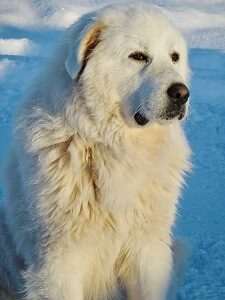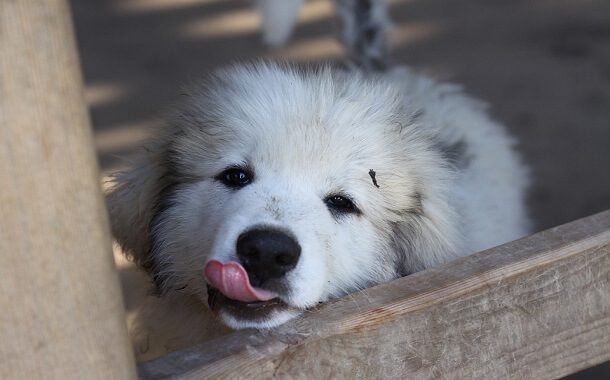Great Pyrenees Cost
Last Updated on December 27, 2023
Written by CPA Alec Pow | Content Reviewed by ![]() CFA Alexander Popinker
CFA Alexander Popinker
The Great Pyrenees is considered one of the oldest natural breeds and some believe that this breed can be dated around 3000 BC. The Great Pyrenees has the appearance of a large white bear. With its double fur and native protector instincts, this breed is both an excellent guard for sheep herds and a good companion.
This breed developed in the rocky mountains of the Pyrenees and is considered to be a descendant of mastiff-type dogs, which are still found today in the Baltic regions and on the coasts of the North Sea. He is also a descendant of the Hungarian Kuvasz and is related to St. Bernard and Newfoundland (Terra Nova). The Great Pyrenees Shepherd, also known as the Pyrenean Shepherd, was originally used to guard sheep herds against bears and wolves. These dogs were also used to pull sleds. On the ridges of the Pyrenees, these dogs are similar to walking snowmen.
How Much Does a Great Pyrenees Cost?
Depending on the age, gender, reputation of the breeder, dog’s pedigree, and geographical location, the average price of a Great Pyrenees is anywhere between $320 and $1550.
Compared to other breeds, the price of a Great Pyrenees is not that high, but be prepared to pay more for a healthy dog of high quality. There are several price offers on specialized websites such as LancasterPuppies and NextDayPets with prices ranging from $600 to $2,000. Though, a top-quality dog might cost you close to $6,000.
You can find a trusted Great Pyrenees breeder near your location by searching through the database offered by the Great Pyrenees Club of America.
What should be included in the price of the Great Pyrenees dog?
Pedigree Certificate – this document has the dog’s family tree and information regarding previous generations of the dog’s heritage.
Medical Records – these files contain information regarding the actual medical condition and the medical history of the dog. They will also contain information referring to the possible genetic health problems because the Great Pyrenees tend to inherit eye problems, heart diseases, and hip dysplasia.
Sale Documentation – this is a legal agreement between the buyer and the breeder. In it, you will find the conditions of the transaction that everybody agrees to.
Different Freebies – usually, breeders and rescue shelters offer freebies when giving you the pet. Things such as accessories (collar, water bowls, leash) and dog food might be included in the adoption.
Great Pyrenees details
The Pyrenean Shepherd dog is a large animal, which impresses with its imposing stature. You might even call it huge. The average height for a male is 26 and 32 inches, and the weight is between 99 and 158 pounds.
It has a strong and muscular body but is elegant and athletic at the same time, with a wide chest, a strong neck, and solid limbs. The Pyrenean Shepherd has a thick and bushy fur, with a wool-like texture. The fur is generally white, but can also be white with brown, gray, or light yellow spots.
What are the extra costs?
The long and dense fur of the Pyrenean Shepherd needs regular care, especially during the shedding periods. In order to keep their fur clean and beautiful, people who own Pyrenean Shepherds must brush them at least once a week. It is also good to wash them when the fur gets dirty.
The cost of a professional grooming package is around $60 and includes brushing, ear cleaning, bathing, and nail trimming.
You might also like our articles about the cost of a Rottweiler, Tibetan Mastiff, or Caucasian Shepherd.
This breed should be fed two meals a day, with up to three cups of dry dog food at each meal. The amount of food your dog will need will depend on the size, activity level, age, and other factors. Discuss your dog’s individual nutritional needs with your veterinarian. Monitor the dog’s weight to prevent overeating and obesity. However, you should budget around $65 for a 33-pound bag of dog food.
The life expectancy of the Pyrenean Shepherd dog is approximately 12 years. It is more prone to bloating, hip dysplasia, bone cancer, and dislocations. Also, in the hot season, it can suffer from various skin conditions. So, it is important to have vet visits regularly. Also, you should neuter or spay your pet and this would cost around $200. Besides this, you should also budget for vaccines, that are priced anywhere between $12 and $25 each, depending on the type.
Be prepared to spend some money on the accessories the Great Pyrenees needs such as the water and food bowls that cost $7 to $40 each, and for the toys to keep him busy and active. Depending on size, a toy might cost anywhere between $5 and $12.
The dog’s shelter is an essential cost to consider. He will require a crate for traveling and a bed for sleeping at home. The size of the crate should be at least 48”x32”x35” and the bedding must be at least 48”x30”. The price of a good quality bed is anywhere between $35 and $90, while a giant-sized crate might cost around $200.
Important things to consider
 The Pyrenean Shepherd is calm, obedient, and very devoted to his master. His courage and intelligence make him a very good watchdog. However, it has a certain independence and tends to dominate. Thus, he can be aggressive with other large dogs, but he will have no problem with smaller pets.
The Pyrenean Shepherd is calm, obedient, and very devoted to his master. His courage and intelligence make him a very good watchdog. However, it has a certain independence and tends to dominate. Thus, he can be aggressive with other large dogs, but he will have no problem with smaller pets.
Being a friendly dog, he loves to be around children, with whom he will be very affectionate and whom he will protect. When it comes to foreigners, the Pyrenean shepherd will tend to be reserved and suspicious. However, he will not become aggressive unless provoked.
This dog is also ideal for assisted therapies, in children’s and old people’s homes or in hospitals.
Like any dog, the Pyrenean Shepherd needs socialization and involvement in as many activities as possible. People who own such dogs must pay close attention to them and dedicate precious time to them.
This dog needs a lot of movement, especially if he is raised in the city. In the warm season, it tends to become sedentary, so daily walks are essential.
The Pyrenean Shepherd dog is suitable for living in rural areas, in the yard, where it has enough space for development and exploration.
The Pyrenean Shepherd dog is intelligent and quickly learns the basics. But he gets bored very fast, so training must be as diverse as possible. It is very intuitive, polite, and with an “elephant” memory.
How can I save money?
If you want to get a Great Pyrenees, adoption is usually cheaper, but there’s no guarantee of its pedigrees or registration. You can also find them at the rescue centers. There is a list of Great Pyrenees waiting to find a new home on The National Pyr Rescue’s official website page. Also, you can find more dogs that need adoption by visiting the Great Pyrenees Rescue Society or Petfinder website.


Leave a Reply
Want to join the discussion?Feel free to contribute!